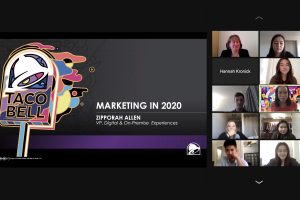
On Saturday, November 7, over seventy-five students from universities from across the country attended the JHU American Marketing Association’s annual regional conference. The 2020 conference, titled Marketing During a Pandemic and Heightened Social Consciousness, invited guest speakers from Taco Bell, Twitter and FCB to present on how their brands pivoted in 2020 to address the changing social, technological, economic, and political impact of the COVID-19 pandemic and recent social unrest.
The competition itself proved to be a challenge to host for the CLE-sponsored student organization due to the impact of the pandemic. AMA conference coordinator Grant Gibbs noted that planning the event required that he, faculty sponsor Leslie Kendrick, and AMA president Katarina Misa reimagine what the conference would be in a virtual space.
“There was a lot more planning and coordination that needed to take place in order to ensure that the event went off without a hitch,” Gibbs said. He noted, though, that a positive outcome of planning a virtual event was that AMA was able to expand their invitee list. Grant was proud that AMA was “able to offer [the conference] to students all across the country, whereas in previous years the conference was limited to students who could come in for the day.”
Presenters included Zipporah Allen, vice president of digital experiences at Taco Bell, who provided an overview of the impact of the pandemic on the fast-food industry; Hannah Kronick, a senior client account manager at Twitter, who addressed the unity social media users found during the pandemic; and Breton Pennotti, executive vice president and group management director at Neon (an FCB Health Network Company), who discussed how healthcare marketers worked to reassure clients about safety in healthcare facilities.
In addition to guest speakers, the conference featured a case competition. Eight teams competed, comprised of students from all over the country, including teams from Carnegie Mellon University and the University of Utah. Hopkins took first place, with second place going to the Carnegie Mellon team and third place to a team from West Virginia University. Ten local marketing practitioners from organizations such as the San Francisco 49ers and the outdoor adventure brand GoApe, served as judges.